-
See the Difference: Save $1,000 on LASIK , Find More
*Must mention this promotion and be treated before April 30 of 2025 to qualify. $1,000 off for both eyes on standard Wavelight price, $500 off for one eye. Cannot be combined with any other offers.
Tired of wearing glasses? LASIK is the solution!
Astigmatism, commonly mispronounced as “astigmatism”, is different from farsightedness and nearsightedness in that it is not typically caused by eye disease. In fact, it is not commonly caused by an eye health problem either. It is usually a mechanical defect in the eye that impacts how it focuses light.
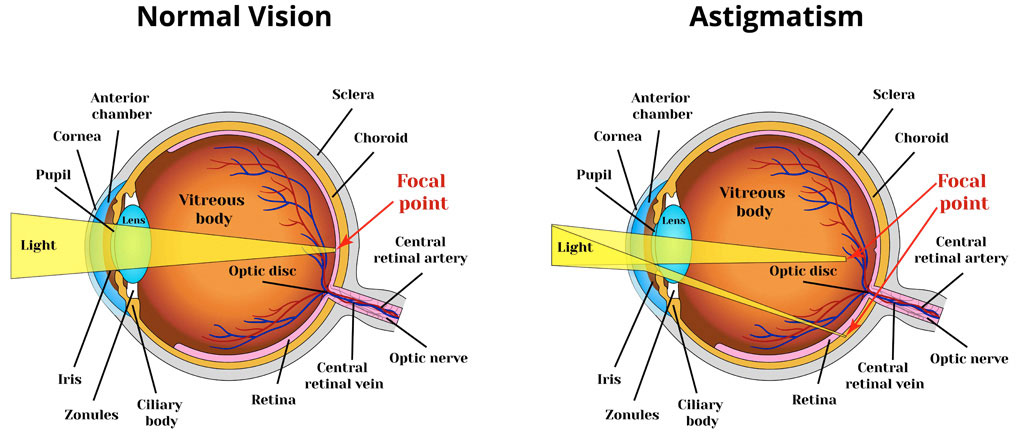
What are the common causes of Astigmatism?
Corneal Astigmatism
The curvature of the cornea may have a defect that causes an oblong corneal shape, as opposed to the desired spherical corneal shape, which in-turn causes a refractive error. This refractive error prevents light from coming into a single focus on the retina. That is, the light will fall into multiple focus points behind or in front of the retina, or even both, which causes blurry, distorted, or double vision.
Lenticular Astigmatism
Similarly, to corneal astigmatism, lenticular astigmatism is caused by an imperfect curvature of the lens which focuses light behind or in front of the retina. The symptoms of lenticular astigmatism are the same as corneal astigmatism.
[clear]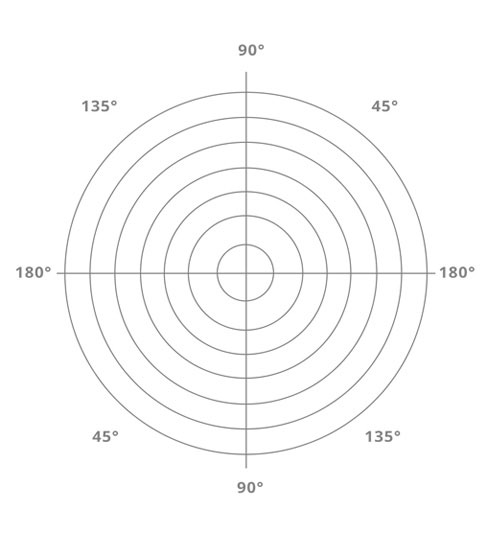
What are eye meridians and how do they relate to Astigmatism?
Eye Meridians ( Ocular Meridians ) are lines that mark degrees from 1 to 180 as depicted in the graphic.
Astigmatism, as described above, occurs when the light is not focused to a single point on the retina. In astigmatism, the corneal surface is typically toric, causing each of the ocular meridians to refract light uniquely. Principal Meridians are those meridians which refract the most and the least amount. Each of the two principal meridians focuses light on different points. There are three forms of astigmatism. That is regular astigmatism, irregular astigmatism, and oblique astigmatism.
What is regular astigmatism?
Regular astigmatism occurs when the principal meridians are separated by 90 degrees on the 90° and 180° lines. An example being 180° / 90° ).
What is irregular astigmatism?
Irregular astigmatism, which is typically caused by a physical injury that caused scarring on the cornea, occurs when the principal meridians are not perpendicular to one another.
What is oblique astigmatism?
Oblique astigmatism is identical to regular astigmatism, where the principal meridians are perpendicular to one another, with the difference being that they are not at 90° or 180°, respectively. Oblique astigmatism is a tilted version of regular astigmatism, such as 40° / 130°.
What are the three main most common types of Astigmatism?
The three commonly known types of astigmatism are myopic astigmatism, hyperopic astigmatism, and mixed astigmatism.
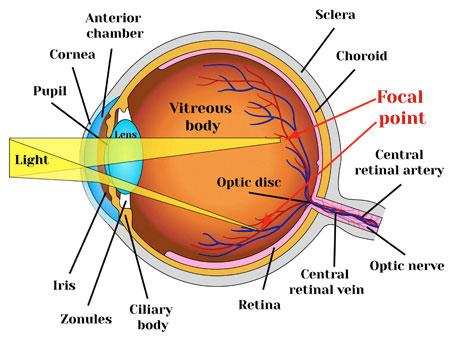
What is Myopic Astigmatism?
Myopic Astigmatism occurs when one or two principal ocular meridians focus light in front of the retina (are nearsighted).
[clear]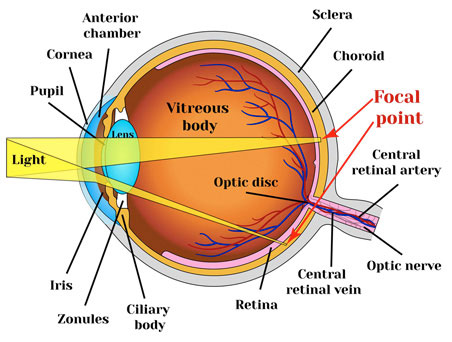
What is Hyperopic Astigmatism?
Hyperopic astigmatism occurs when one or two principal ocular meridians focus light behind the retina (are farsighted).
[clear]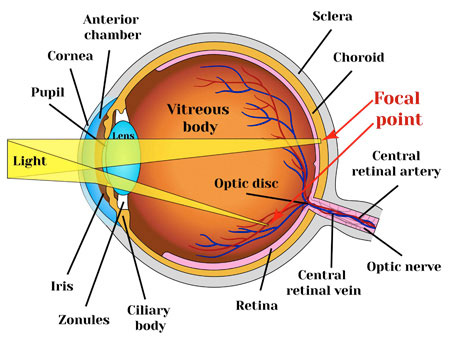
What is mixed astigmatism?
Mixed astigmatism occurs when one principal ocular meridian focuses light behind the retina ( is farsighted ) and the other principal ocular meridian focuses light in front of the retina ( is nearsighted ).
[clear]
Is LASIK or PRK at LasikPlus a long-term solution to correcting astigmatism?
Yes! Both LASIK and PRK are types of “refractive surgery” and can safely and permanently correct most types of astigmatism. Not only that, these procedures can also correct nearsightedness and farsightedness. If you are interested in learning more, visit our LASIK or PRK sections or contact a LasikPlus location near you for a free eye exam and consultation. LasikPlus doctors are revered as the most capable eye surgeons in town. Research on Yelp, Google, and other credible places on the web to see what people are saying about their experience having astigmatism correction via LASIK or PRK at LasikPlus.
YOU MIGHT ALSO LIKE...
VISION CENTERS NEAR ME
Enter your zip code, city, or a doctor name below to find a vision center.
Find out if LASIK is right for you
Congratulations!
Your vision issues can most likely be corrected with a LASIK procedure. Schedule a free consultation today.
Answer 5 simple questions to see if you are a candidate
What is your age group?
Do you wear...
With corrective lenses, do you have...
Have you ever been told that you have astigmatism?
Have you ever been told that you have dry eyes?
Request an Information Kit
Learn about your surgeon, the latest advanced technology, procedures, options and benefits, financing options, and what to expect from your LASIKPlus experience.









